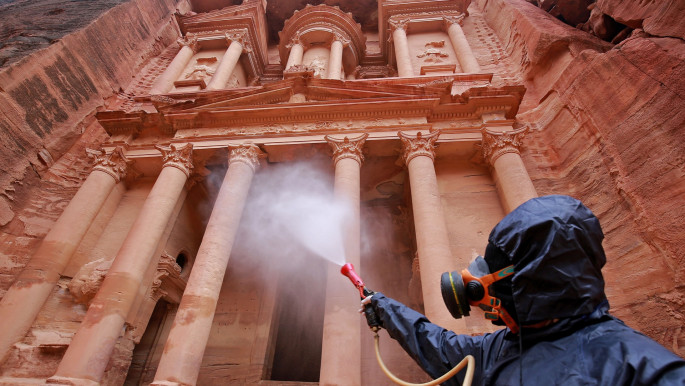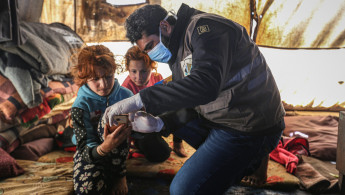Fighting for an education: How children in the Middle East are learning under lockdown
Will children have to repeat the year? And what of their academic progress? Such questions prove difficult to answer, and despite the pandemic, governments are looking for ways to maintain normalcy and in the case of children, education.
In the Middle East - from the United Arab Emirates (UAE) and Jordan, to Egypt and Algeria - governments have implemented stringent lockdown measures that prevent citizens from leaving their homes and stop children from attending schools.
These were part of global measures, on the tail of advice from the World Health Organisation (WHO), to curb the spread of Covid-19 as countries suffer.
Turkey's health minister recently announced the country's confirmed coronavirus cases had risen to 140,000 (with 3,841 deaths), overtaking neighbouring Iran (with 109,000 cases) for the first time to register the highest total in the Middle East.
Though the disruption of education services may prove to have long-term effects, the United Nations Children's Fund (UNICEF) has been making its mark with a novel learning tool that is being expanded in light of Covid-19: The Learning Passport.
 |
In the Middle East, governments have implemented stringent lockdown measures that prevent citizens from leaving their homes and stop children from attending schools |  |
"The learning passport is a partnership between UNICEF, Microsoft and the University of Cambridge and it's a tool to provide quality education to vulnerable children," Robert Jenkins, Chief Education and Associate Director told The New Arab.
"It's a very flexible tool – it has the capacity to work offline, so children can be reached in a variety of environments, and it is tailored to local curriculums. Sometimes our education partners want to tailor the tool for teachers to more effectively deliver their curriculums."
"In other cases it's in addition to teachers or even straight to students as a learning tool. It has depended on the environment and the context," Jenkins added. "It's a tool that is filling gaps – it's powerful and flexible."
Apps and the net: Connection (and disconnection) in the region
 |
|
| Read more: Learning under lockdown: How Jordan's students are adapting to the coronavirus pandemic |
This has been particularly the case for remote learning initiatives in Jordan.
Jordan has used online learning platforms Darsak and Noorspace as a form of remote learning, and with Covid-19, those have been expanded thanks to the government and UNICEF.
Over 6,000 adolescent boys and girls are continuing accredited non-formal education through distance learning support for which is provided through WhatsApp groups created and managed by the Makani Program front-line staff.
Such measures are blossoming across the region. In Palestine the organisation partnered with the Ministry of Education to support a plan to ensure the continuity of education for all children during school closures, and they developed a mechanism for monitoring children's access to online learning through the e-learning platform, which, as of 1 April, 2020, 106,558 children are accessing.
Algeria is in the process of recording televised courses for some 30,597 primacy and lower-secondary school children, supporting them as Covid-19 continues to bring uncertainty to their education, according to UNICEF figures provided to The New Arab.
In Iraq, a place that is ravaged not only by Covid-19, but whose public infrastructure is damaged by war, children continue their education via online learning as well as the delivery of key materials through TV and mobile networks.
 |
A recent study into the mental health of 1,784 school children aged 6-12 in Hubei province, China, found that 22.6 percent reported symptoms of depression - 30 percent higher than the average |  |
Refugee camps offer another challenge for children. In Egypt, an online portal which allows students to continue online classes puts special emphasis on rural and refugee populations. Use of national IDs on this platform allows monitoring of student access and usage.
Children with disabilities in refugee camps with no access to the internet or devices have received printed learning packs, with the families of 1,193 children with disabilities receiving weekly phone follow-up and guidance to care for their children (explanatory video recordings, voice recordings and links to educational applications).
A post-Covid-19 world?
"Countries in the Middle East are planning the reopening of schools and so how do we use the current [situation] to continue remote learning and reaching vulnerable children who can re-enter schools when they reopen?" Jenkins said.
Indeed, Iran seems to be coming out on the other side and the government announced that schools are to reopen on 16 May - despite only recently being the "epicentre" of the novel coronavirus in the region.
Jenkins said lessons need to be learned from the Ebola virus outbreak in West Africa.
Read more: For Bedouin students, the coronavirus pandemic is a stark reminder of Israel's inequality
"We learned from the extended school closures from the Ebola crisis in West Africa – where schools were closed for between six months, and some countries nine months," he told The New Arab.
"As schools reopened after that pandemic, it was very clear that if children were to be successful in school, they needed to have a broad range of support available, health, nutrition support, greater emphasis on hygiene but also importantly their emotional and mental health."
A recent study into the mental health of 1,784 school children aged 6-12 in Hubei province, China found that 22.6 percent reported symptoms of depression – 30 percent higher than the average.
Anxiety levels were also higher, warning countries across the world that the mental health of young people in quarantine should be a topic of great national focus.
The path to a post-Covid-19 curriculum may yet be far off, but children, parents and educators are paving the way.
Narjas Zatat is a staff journalist at The New Arab.
Follow her on Twitter: @Narjas_Zatat



